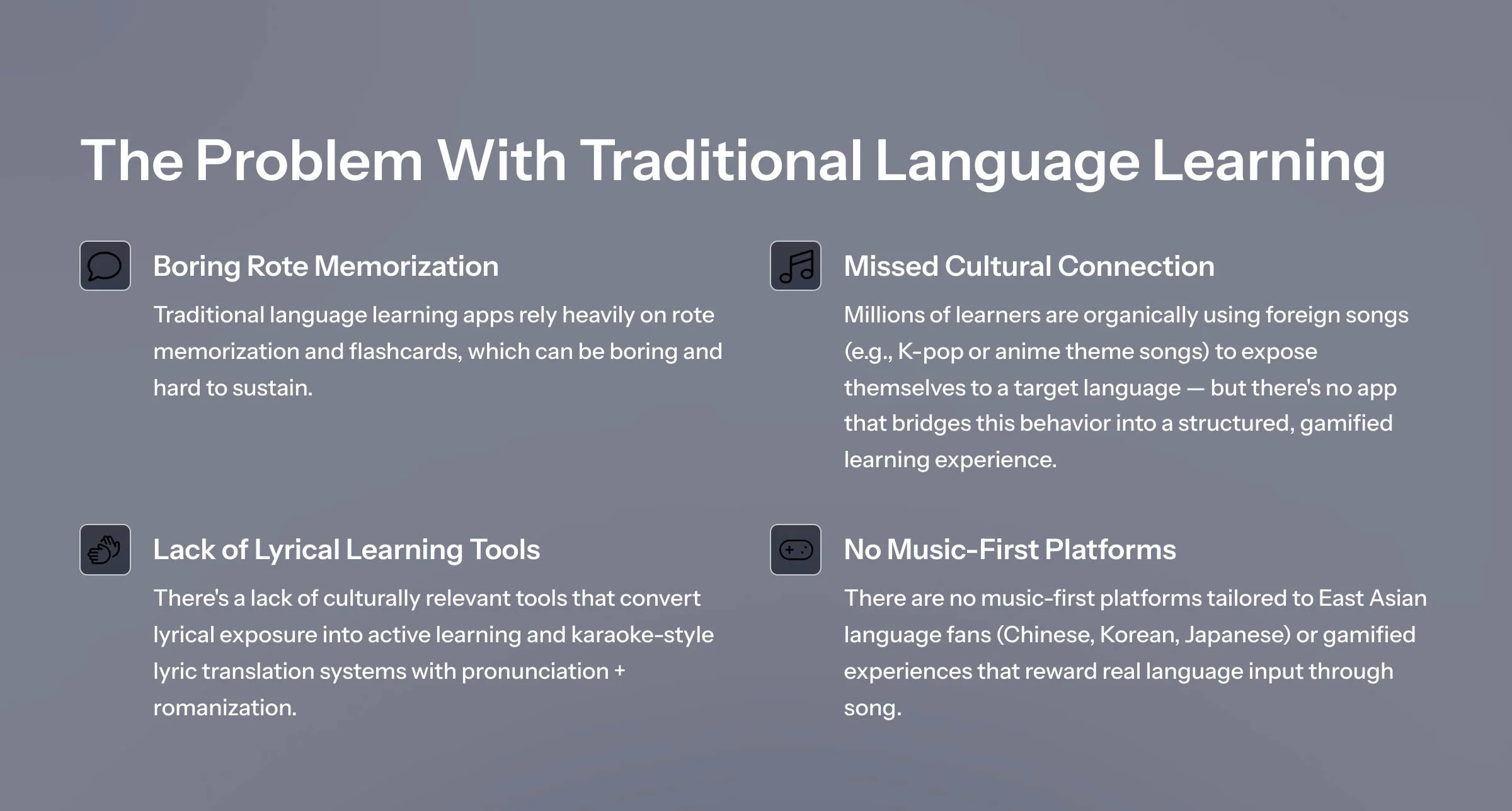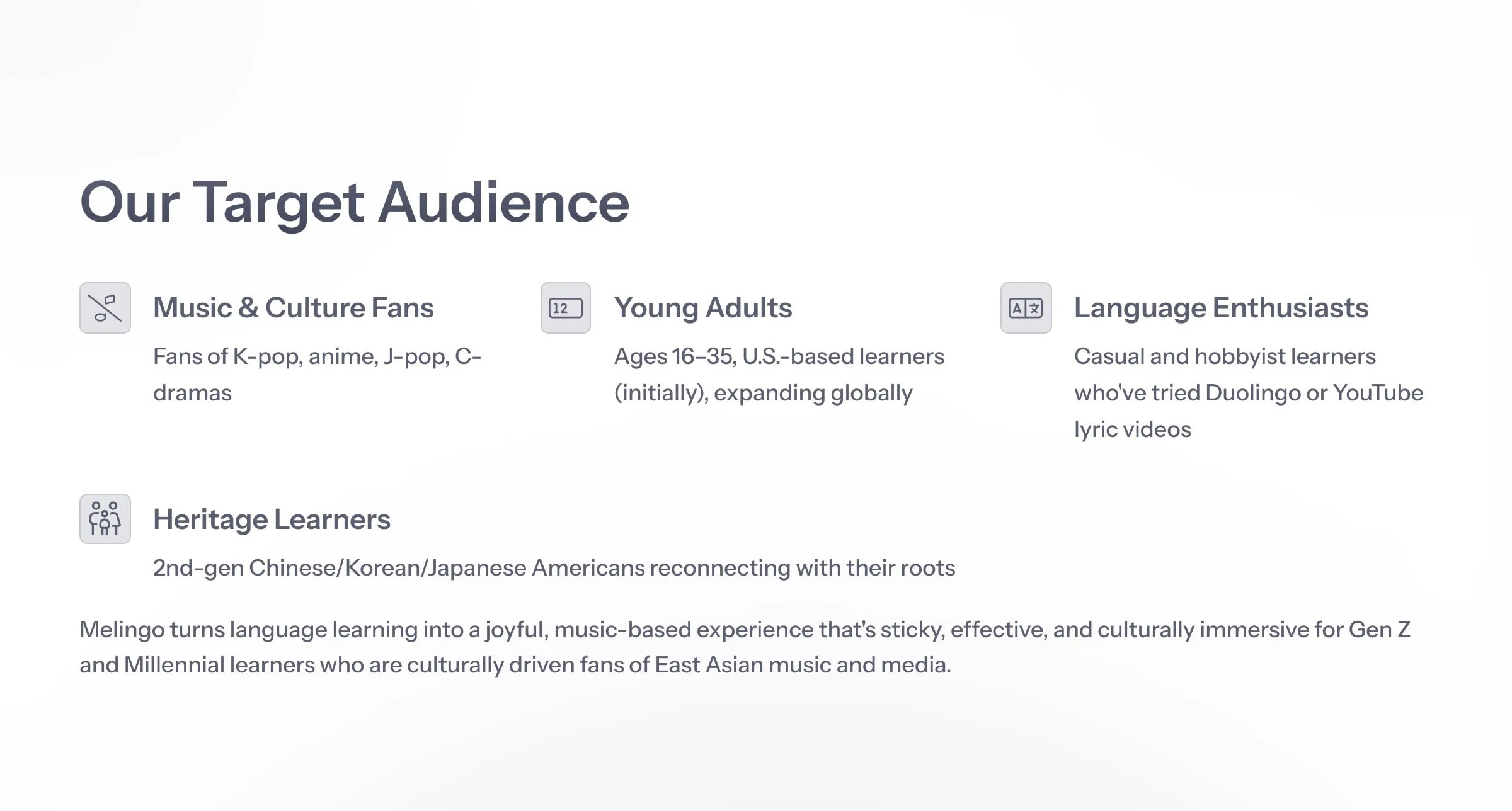Melingo is a self-initiated case study born from my curiosity about AI and my personal experiences learning languages through music. Noticing how traditional apps like Duolingo fail to engage users emotionally, I designed and built a prototype that combines real-time lyric translation, pronunciation aids, and karaoke-style interaction to make language learning more immersive. I led all product work end-to-end — from market research and persona development to wiring framing/mockups, frontend implementation, and prompt engineering (Vibe Coding). The project challenged me to think critically about user motivation, scope a scalable MVP, and test creative ways to blend entertainment with education.
Demo is available upon request!
Skills Showcased:
End-to-end product development from concept to launch
Persona creation and user segmentation to drive feature prioritization
MVP scoping and feature reduction for fast, high-value delivery
AI integration using GPT-4 for dynamic translation and conversational teaching
Prompt engineering for consistent and teachable AI output
Market research and opportunity sizing using consumer and edtech trends
Gamification and habit loop design for user retention
Brand identity and naming strategy, including logo, style guide, and positioning
Wireframing Melingo
When conceptualizing the user experience and platform flow, I wanted a simplistic and intuitive design. My inspiration is akin to that of Duolingo.
User-friendly Experience
Translating lyrics is the most quintessential function on Melingo. Users can simply copy & paste their lyrics, specify their language, and let GPT-4 handle the rest. The prompt is specifically tailored to output a version of romanization that is easier to read as an native English speaker.
Melingo MVP PRD
Summary
Melingo is a music-powered language learning platform that enables users to learn Chinese, Korean, and Japanese through karaoke-style lyric immersion, real-time translation, and gamified progress tracking. Users engage with their favorite songs while building language skills via contextual learning, repetition, and emotional connection.
The app is designed for Gen Z and Millennial learners (ages 16–35) who are culturally driven — fans of K-pop, J-pop, anime, C-dramas, and East Asian music. Melingo turns language learning into a joyful, music-based experience that’s sticky, effective, and culturally immersive.
Problem
Traditional language learning apps rely heavily on rote memorization and flashcards, which can be boring and hard to sustain. Meanwhile, millions of learners are organically using foreign songs (e.g., K-pop or anime theme songs) to expose themselves to a target language — but there’s no app that bridges this behavior into a structured, gamified learning experience.
There’s a lack of:
Culturally relevant tools that convert lyrical exposure into active learning
Karaoke-style lyric translation systems with pronunciation + romanization
Music-first platforms tailored to East Asian language fans (Chinese, Korean, Japanese)
Gamified experiences that reward real language input through song
Market Fit & Opportunity
Macro Trends
The language learning apps market is growing at a CAGR of 14.4%, projected to reach $16.2B by 2033, with North America contributing 38% of that growth. Link
Chinese, Korean, and Japanese are the fastest-growing target languages among U.S. learners, especially Gen Z
Music is a top motivation and tool for language learning: 52% of Americans use music to learn a language, and 74% say they’ve learned new words via foreign songs
Cultural waves (K-pop, anime, J-dramas, C-dramas) are pulling more learners into language study through entertainment
Melingo’s Niche
Melingo sits at the intersection of:
Karaoke interaction
Romanized + English-friendly lyric translations
Memory-aiding lyric repetition
Gamified tasks and streaks
This provides differentiation from Duolingo (which lacks musical context), LingoClip (minimal gamification), and Kpop Pro (Korean-only). Melingo can scale across multiple languages with content packs.
Target Audience
Ages 16–35
U.S.-based learners (initially), expanding globally
Fans of K-pop, anime, J-pop, C-dramas
Casual and hobbyist learners
Learners who’ve tried Duolingo or YouTube lyric videosHeritage learners (2nd-gen Chinese/Korean/Japanese)
MVP Features & Product Release Strategy
In the first 3-6 months post-MVP launch, Melingo will be hyper-focused in top of funnel and mid-funnel growth. The goal will be to grow and generate interest with the freemium features such as the lyrics translator.
Karaoke Lyric Player
Time-synced lyrics with:
Original line
Romanization (Pinyin, Revised RR, Hepburn)
K-Speak™ (English-friendly pronunciation)
Natural English translationLine-by-line toggles (customize what you see)
“Karaoke Mode” with playback control + highlight animation
User Dashboard
Personalized stats (songs learned, lyrics memorized, streaks)
Task checklist (practice, review, new song)
Achievement board
Integrated karaoke player
Future Enhancements (Post-MVP)
AI pronunciation feedback
Social features (song clubs, duet mode, community playlists)
Smart curriculum progression (beginner → fluent by song complexity)
School/teacher version
Song Discovery
Search by language, genre, difficulty, artist
Curated packs (e.g., “Anime Ballads”, “Top K-Pop Choruses”)
“Learned” vs “In Progress” playlists
Learning Tools
“Verse Quizzes”: fill in missing words, match pronunciation, or reorder lines
“Lyric Breakdown” view per songTap-to-reveal translations and definitions
“Replay this phrase” button with spaced repetition
Gamification
XP system for learning songs
Daily/weekly streaks
Achievements (e.g., First Song, 10-Day Streak, Fluent Chorus)Challenge modes (e.g., “Perfectly Sing This Verse”)
Leaderboards (optional, friendly competition)
Revenue Model (Concept)
Melingo would benefit from having a freemium model to drive conversions to paid subscriptions. Leveraging sticky, but free features like the lyrics translation feature and free account sign ups to track song histories - we can attract more top of funnel users and potentially increase converstion. Below is an outline of hypothetical prices and other avenues of revenue:
Freemium model
Free: 3 song unlocks/day, limited quiz attempts, community mode
Premium ($4.99–$7.99/month): unlimited songs, offline access, advanced scoring, exclusive content packs
Music partnership revenue (labels, artists)
Affiliate sales (Spotify/Apple Music deep links, merch partners)
Success Metrics
User Engagement
Avg. time spent per session (target: 7+ minutes)
Songs learned per week
Streaks and task completion rate for user engagement
Growth
Conversion-to-Premium for growth
Week-over-week (WoW) account creation
WoW premium enrollment (without trying for free first)
Retention
Daily Active Users (DAUs) / Monthly Active Users (MAUs)







